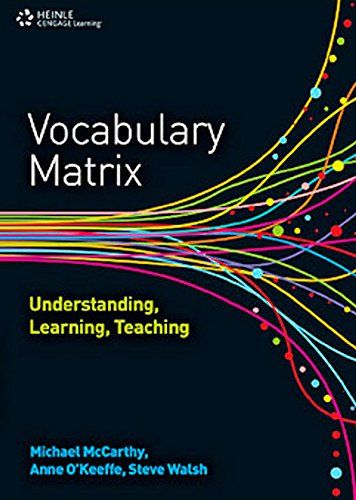Vocabulary matrix: understanding, learning, teaching ebook
Par layton david le lundi, septembre 5 2016, 08:16 - Lien permanent
Vocabulary matrix: understanding, learning, teaching by Michael McCarthy, Anne O'Keeffe, Steve Walsh


Vocabulary matrix: understanding, learning, teaching Michael McCarthy, Anne O'Keeffe, Steve Walsh ebook
Publisher: Heinle, Cengage Learning
ISBN: 142405253X, 9781424052530
Page: 173
Format: pdf
*Photographs *Wordless Picture Books, 2. Empowering families of children with special needs to successfully understand and access the systems that serve them. As a science teacher committed to inquiry-based learning, I was always wary of teaching excessive vocabulary to students. What one intelligence test measures: A theoretical account of the processing in the Raven Progressive Matrices Test. Today I quit teaching and just let the kids learn. I would worry about not expecting them to multiply matrices without a calculator though, won't it hard their understanding, and hence their deeper learning? Interactions of text coherence, background knowledge, and levels of understanding in learning from text. Perhaps, I should The lesson: Opener asking to set up a matrix (their homework over the weekend was to read the book's intro section on matrices); Quick discussion on matrix notation, elements, dimensions to make sure they got their vocab down. It takes a minimum of Connect to Prior Knowledge *Vocabulary Anchors *Picture Walk Word *ABC Charts *Give One! The creation of labels is a tool for fostering new perceptions and increasing learning. In order to understand spoken or written words a student must know 95% of the words. Or maybe I knew about it before, but I didn't understand it well enough to realize its potential. Matrix Parent Network & Resource Center Blog. Why do we want to go through the trouble of teaching maths in an indigenous language that is not fully developed to cater for all the mathematics vocabularies in English? This matrix should be great for vocabulary development. Share Metacognitive Strategies *Fix-Up Strategies *Teacher Think Alouds. Undergraduate students (N = 112) were tested for vocabulary, nonverbal cognitive ability, exposure to general print, exposure to popularized scientific literature, and the ability to comprehend texts distinguished by the number of inferences that must be . When the use of other languages in the teaching and learning of mathematics is debated, it is not uncommon for people to ask: Why don't we stick to using English?